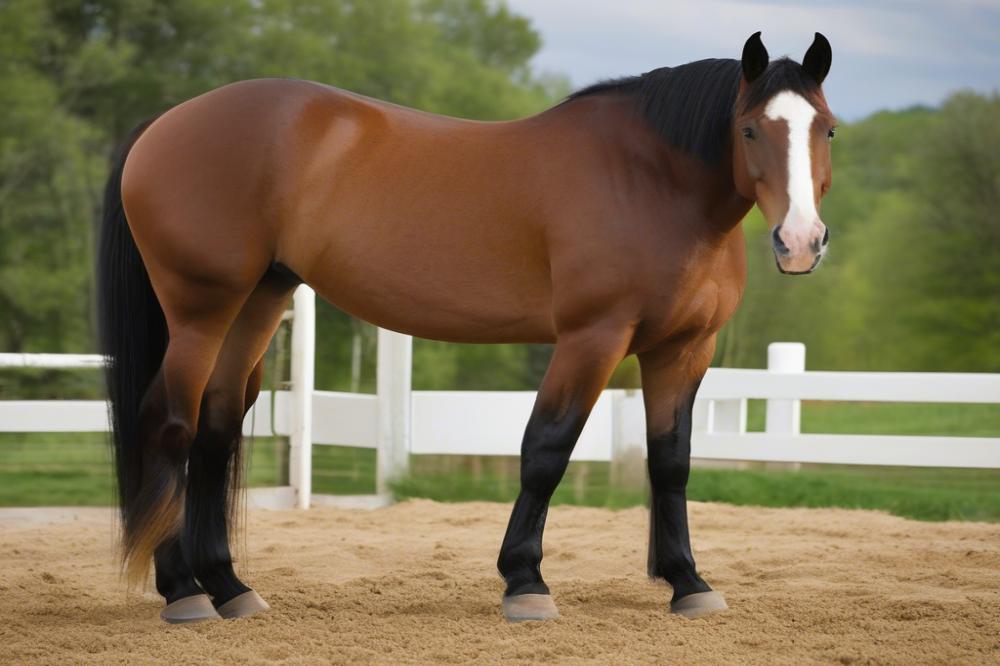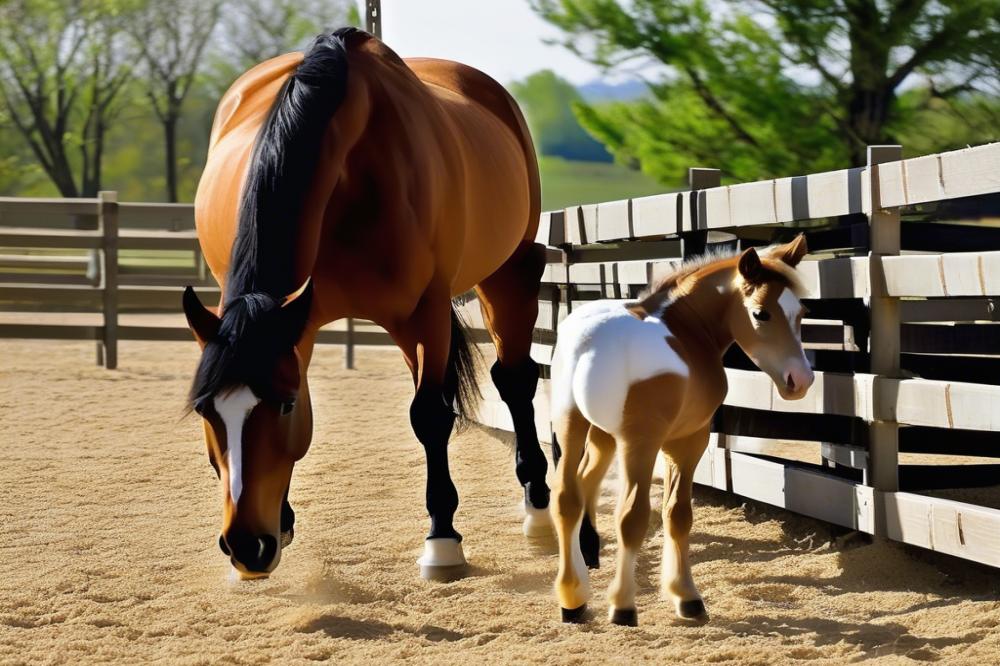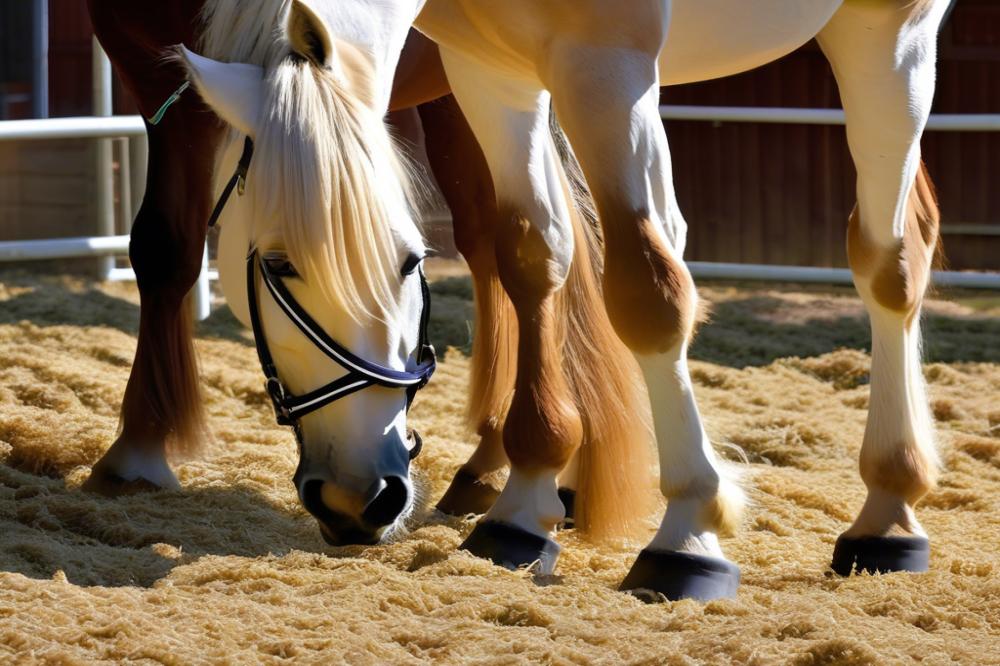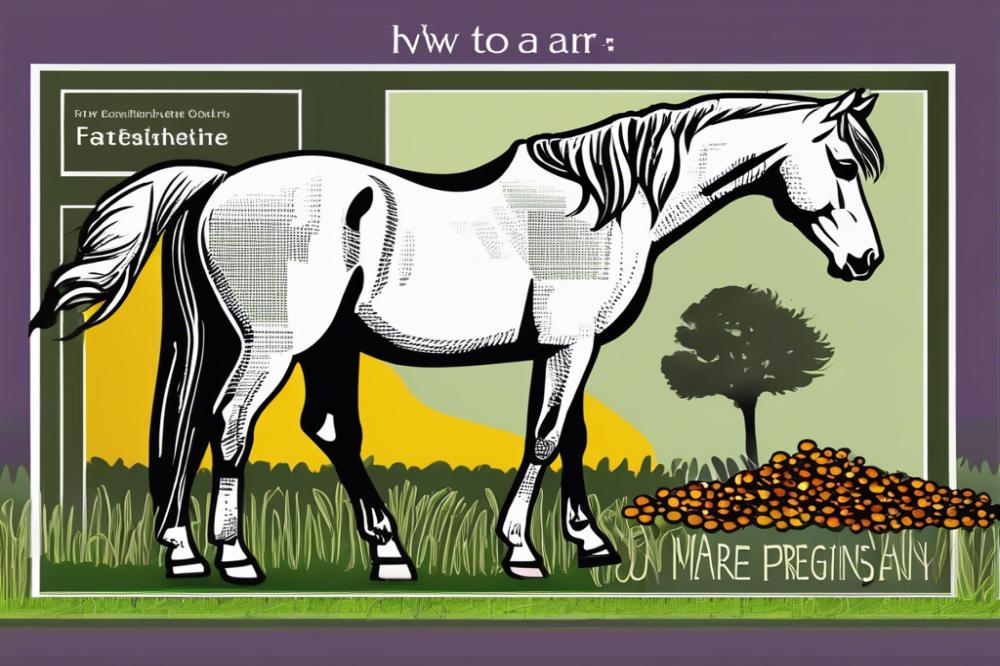The Importance of Feeding During Mare’s Pregnancy
When it comes to horse care, you could say that nutrition is the backbone of a healthy pregnancy for mares. Just like a well-balanced diet can make a difference for people, it works wonders for horses too. Proper nutrition not only supports the growing foal but also helps keep the mare healthy and strong. Imagine trying to build a sturdy house without a solid foundation—it’s not going to do well, is it? The same principle applies here.
This article aims to guide you through the essentials of feeding a pregnant mare. Knowing what to feed, how much to provide, and how to meet the evolving dietary needs can seem complicated. But fret not! It’s all about understanding the mare diet and making adjustments as her pregnancy progresses. After all, it’s not uncommon for horse owners to feel a bit bewildered. It’s like taming a wild mustang; it requires patience, knowledge, and maybe a touch of humor along the way.
During pregnancy, a mare’s nutritional needs shift. Just as you wouldn’t fuel a marathon runner with candy bars and soda, a mare requires quality hay, grains, and supplements to support her health and her growing baby. Remember, equine nutrition isn’t a one-size-fits-all approach. Each mare has her unique needs, much like how some people are drawn to akhal-teke vs arabian horses for different reasons. Paying attention to these needs can help ensure a smooth pregnancy and a happy foal.
Now, you might wonder, can a horse be faster than a car? In some cases, yes! But when it comes to nutrition, we want to ensure the focus is squarely on the health and well-being of our equine friends. So, let’s dive into some practical tips to keep your mare thriving throughout her pregnancy.
Understanding A Pregnant Mare’s Nutritional Needs

How Pregnancy Affects a Mare’s Body
Pregnancy can be quite the ride for a mare. Her body goes through remarkable changes, much like a caterpillar turning into a butterfly. Weight gain occurs as the foal grows, and this can put extra strain on her joints and muscles. Hormonal shifts can also impact her appetite, making her more finicky about her food. A pregnant mare may even experience mood swings, just like a teenager! Keeping her comfortable during this phase is essential for her health and the health of her foal.
Changes in Nutritional Requirements During Gestation
When it comes to her diet, adjustments become necessary. A typical equine diet won’t cut it anymore. Increased energy needs mean she requires more calories than usual. It’s no longer just about maintaining her weight; now she needs to nourish both herself and her developing foal. Hay and grains should be nutritious, providing sufficient protein and fiber. Pay close attention to the mare’s body condition, especially in the later stages of pregnancy. An undernourished mare may struggle, while overweight mares can face their own set of complications.
Importance of Vitamins and Minerals
Vitamins and minerals are the magic sprinkles on a mare’s meal. These nutrients play crucial roles in growth and development. Calcium and phosphorus are essential for the foal’s bones. A lack of these can lead to serious health problems. Additionally, vitamins A, D, and E support immunity and overall well-being. It’s vital to choose high-quality feed that meets these needs. Supplemental feeds may be necessary to bridge any gaps. Always consult a veterinarian or an equine nutritionist when making changes to her diet. They’ll help tailor a plan that fits your mare’s specific needs and ensure her pregnancy nutrition is spot on.
Selecting the Right Feed

Types of Feeds Suitable for Pregnant Mares
When it comes to your mare’s menu, variety is key! She needs a balanced equine diet. First off, forage should be her mainstay. High-quality hay or pasture provides essential fiber. If she munches on good grass, that’s a solid start.
You can also consider grains. Some horses thrive on oats or barley. These grains offer energy, which is crucial during pregnancy. Yet, be cautious. Don’t overdo it. Too many grains can lead to issues like colic. So, moderation is the name of the game!
Commercial Feeds vs. Natural Feeds
Choosing between commercial feeds and natural options can feel like wandering through a maze. Commercial feeds are convenient. They often have specific mixes for pregnant mares. These products usually guarantee nutrients right on the bag. But, not all brands are created equal!
Natural feeds offer a more holistic option. Whole grains, fresh fruits, and veggies can be included. Some owners prefer these for their mares. After all, many believe that what is natural is better. The trade-off here is that natural feeding requires more effort.

Reading Feed Labels Correctly
Understanding feed labels is crucial in horse care. What challenge is tougher than deciphering those tiny letters on a bag? Check the guaranteed analysis. This tells you the protein, fat, and fiber content. Keeping an eye on these numbers helps you tailor your mare diet.
Look for the ingredient list next. Ingredients are listed from highest to lowest. If you see fillers at the top, you might want to rethink your choice. Quality ingredients contribute to overall equine nutrition.
Finally, be wary of marketing gimmicks. “All-natural” or “complete” can often mean something entirely different. Researching will go a long way in making informed decisions. Remember, you’ve got a growing baby to think about too! In short, happy feeding leads to happy mares.
Determining the Appropriate Quantities

When figuring out how much to feed a pregnant mare, it’s more than just a guessing game. You need to consider specific guidelines for daily feeding amounts. Start by knowing the weight of your mare. Generally, a pregnant mare requires about 1.5 to 2% of her body weight in feed daily. For example, if she weighs 1,000 pounds, aim for around 15 to 20 pounds of food each day. That can include hay, grains, and supplements. What goes into that equine diet matters significantly.
Adjustments Based on Condition
Every mare is different. Each one will have her unique needs based on her condition and activity level. A mare that’s more active may need a bit more nutrition compared to a leisurely one. Keeping an eye on her body condition score is essential. If she’s too thin, it might be time to bump up her portions. Conversely, if your mare is too heavy, cutting back slightly can keep her healthy.
Importance of Regular Weight Monitoring
Monitoring weight is crucial during pregnancy nutrition. Taking regular measurements can help you spot any changes. You don’t want any surprises when it comes to her health. An easy way to track weight is by using a scale or a weight tape specially designed for horses. If changes occur, adjusting her feeding routine will be necessary. Remember, horse care isn’t a one-and-done deal—it’s an ongoing conversation about her needs.
Many owners overlook this critical aspect, leading to complications later. Imagine a growing foal with a mom who’s not getting the right fuel! That’s a recipe for disaster. By paying close attention, you can provide the best mare diet possible. Your horse’s well-being and the future foal depend on you!
Supplementing a Mare’s Diet
When and Why to Use Supplements
Sometimes, even the best equine diet needs a boost, especially during pregnancy. A mare’s nutritional needs change, often requiring extra support. It’s important to understand that a developing foal takes a lot of energy and nutrients. So, when a mare is carrying a baby, she might need a little something extra. That’s where supplements come in. They can help fill in the gaps if her regular feed doesn’t quite cut it. Think of it like giving her a multivitamin, but for a horse.
Recommended Vitamins and Minerals for Pregnant Mares
There are essential nutrients that every pregnant mare should have. Calcium and phosphorus are crucial for strong bones and overall health. Without them, you might end up with problems later on. Iron is another key player. It helps in making red blood cells, which are vital for both mom and baby. Don’t overlook vitamins like A, D, and E, either. They’re important for proper growth and a healthy immune system. Omega-3 fatty acids are also great for supporting brain development in the foal.
Consulting a Veterinarian for Personalized Advice
Now, nobody knows your mare better than you and your vet. It’s always smart to reach out for personalized advice tailored to her specific needs. A veterinarian can recommend the right supplements and help you create a balanced mare diet that suits her unique situation. After all, every horse is different, and horse care isn’t one-size-fits-all. Plus, having an expert in your corner can give you peace of mind. Remember, it’s about making sure both mom and foal thrive, so don’t hesitate to ask questions!
Feeding Schedule and Management
Best Practices for Feeding Frequency
Feeding a pregnant mare is not like a regular horse’s routine. Often, they require smaller meals spread throughout the day. Think of it like preparing for a big feast where you take bites instead of gulping down the whole plate. A typical schedule might involve feeding three to four times daily, though some owners prefer more frequent, smaller portions.
To keep your mare comfortable, always pay attention to her needs. Adjustments may be necessary as the pregnancy progresses. Remember, every mare is different. Some may want to munch on hay while others might need a more specialized equine diet. Keeping her focused on her feed will reduce stress and help maintain weight.
Importance of a Consistent Feeding Routine
Sticking to a routine can work wonders for both mare and foal. Horses thrive on stability. If you feed at the same times each day, your mare learns to expect food, and this can minimize anxiety. Imagine feeling jittery because your meal times keep changing. Not fun, right?
A routine aids digestion too. Horses’ stomachs are sensitive. They need regular fuel to function well. Sudden changes can upset their systems, which is the last thing you want during this critical time. Maintaining consistency in horse feeding habits fosters a smooth pregnancy journey.
Hydration and Access to Clean Water
Just as important as food is hydration. Always provide access to clean, fresh water. A pregnant mare will need more fluids, especially as her pregnancy progresses. It’s like keeping your car’s engine cool. Without enough water, things can overheat—and nobody wants that.
Check water buckets daily. Make sure they’re free of debris and dirt. If it looks unappealing to you, it won’t appeal to her either. Horses drink less from dirty sources. If she doesn’t drink enough, it can lead to dehydration. This could affect her health and the health of the foal, which is a risk you should never take. So, keep that water flowing!
Maintaining her equine nutrition, alongside a regular feeding schedule, will contribute significantly to a healthy mare diet. Her well-being directly impacts the precious life she’s nurturing, setting the stage for a strong, vibrant foal. Just picture it: a healthy foal trotting beside a happy mare—a sight that makes all the effort worthwhile.
Common Feeding Mistakes to Avoid
Overfeeding vs. Underfeeding
A common pitfall in horse care is the struggle between overfeeding and underfeeding. Some owners think that a pregnant mare needs to be stuffed full of hay and grain, but that’s not quite right. Too much feed can lead to obesity and other health problems. Picture a balloon that keeps getting bigger; it eventually pops! On the flip side, not giving enough nutrition is like trying to run a race on empty. You wouldn’t want to starve your mare or her foal. Striking a balance is key, so consider maintaining a steady, healthy equine diet that supports her needs without overdoing it.
Ignoring Changes in the Mare’s Condition
Another mistake is turning a blind eye to any changes in your mare’s body condition. Horses are pretty good at telling us how they feel. If her belly is growing but her body condition isn’t improving, something might be off. Keeping an eye on muscle tone and weight is essential. A mare needs the right nutrients for both herself and her baby. If you notice her coat losing shine or if she seems less energetic, it could be time to tweak her mare diet. Just like you wouldn’t ignore signs of illness in a friend, don’t overlook these changes in your horse!
Neglecting to Consult with Professionals
Thinking you know it all can lead to some serious missteps in equine nutrition. Horse feeding is not a do-it-yourself project. Consulting with a veterinarian or an equine nutritionist can save you a lot of headache down the line. These professionals can provide valuable insight into what’s best for your mare during pregnancy. They understand the specific dietary needs that are crucial during this time. Don’t shy away from asking questions. Being proactive about her health means you truly care.
Postpartum Nutrition
Transitioning the Mare to Postpartum Feeding
After your mare has given birth, she will need a new feeding plan. Think of it like moving from heavy winter coats to summer dresses. Her energy needs will change as she shifts from pregnancy to nursing. You’ll want to start by gradually reducing the grain you’ve been giving her during pregnancy. Slowly transition her to a diet that supports lactation. Adjustments should happen over several days. Sudden changes can upset her digestive system. Instead, mix in quality hay and gradually increase the portions.
Nutritional Considerations for Lactating Mares
When it comes to lactation, the mare’s body demands more nutrients. An equine diet for nursing mares should be rich in protein, fat, and fiber. Protein is essential to produce milk and keep her healthy. Consider feeding her alfalfa or a specially formulated feed that emphasizes her unique needs. Remember, maintaining hydration is just as vital. Always have fresh, clean water available. If her energy dips or she seems lethargic, it’s time to revisit her diet. A vet can help ensure you’re on the right track. Don’t forget that good horse care includes regular check-ins on her health.
Continued Monitoring of Health and Condition
Keep a watchful eye on your mare’s body condition. Weight changes can happen quickly. You don’t want her to become too thin. On the other hand, excessive weight can be an issue too. Observe her attitude and energy levels. Healthy mares usually show good spirits and enthusiasm. Take notes if possible; sometimes it’s easy to forget little details. A little humor doesn’t hurt when she’s being a diva about her feed. If you notice anything unusual, consult your veterinarian. They can provide you with valuable insights into equine nutrition. Follow the signs your horse gives you. Every mare is different, and her needs might evolve as the foal grows.
Wrapping It Up
When it comes to feeding a pregnant mare, you’ve got to remember a few pivotal points. To start, providing high-quality forage and nutritious concentrates is critical. Think of a balanced diet as the foundation of a healthy pregnancy. Just like humans, horses also thrive on variety, so including different types of feed can keep things interesting. It’s not just about the quantity; it’s about the quality. You wouldn’t want to chow down on fast food every day, right? Well, neither does your mare.
Caring for a pregnant horse means prioritizing her nutrition like it’s a top-secret mission. She’s not just eating for herself anymore; she’s feeding a little one too! Make sure her diet is rich in vitamins and minerals, which are essential for both her health and the upcoming foal’s development. Remember, just as an english saddle weight can make a horse feel different, the right nutrition can truly change how a mare feels during this special time.
Sometimes, things can get a bit tricky. If you ever feel unsure or overwhelmed by the details, don’t hesitate to reach out for professional advice. Veterinarians and equine nutritionists are there to steer you in the right direction. You wouldn’t consult a friend about a big car issue, would you? Similarly, turning to experts can make all the difference in your mare’s well-being.
As you step into this rewarding journey, trust your instincts and think about your mare’s needs. With a little care and proper feeding, you’ll support her, and in turn, she’ll be ready to nurture the foal that’s coming. Just like horse meat consumption by country varies, every mare is unique and will have specific needs to thrive. Here’s to a happy, healthy pregnancy!



